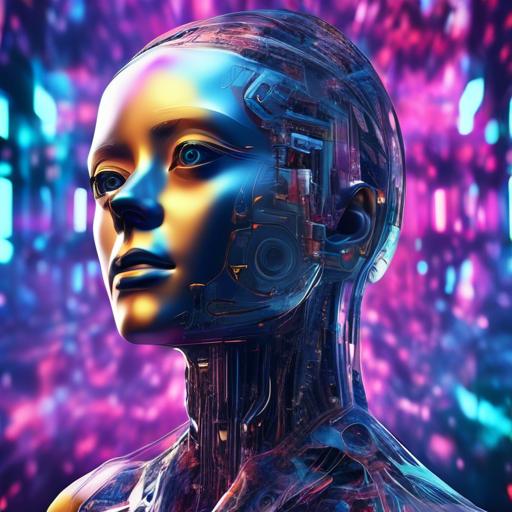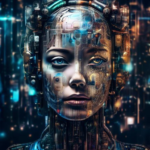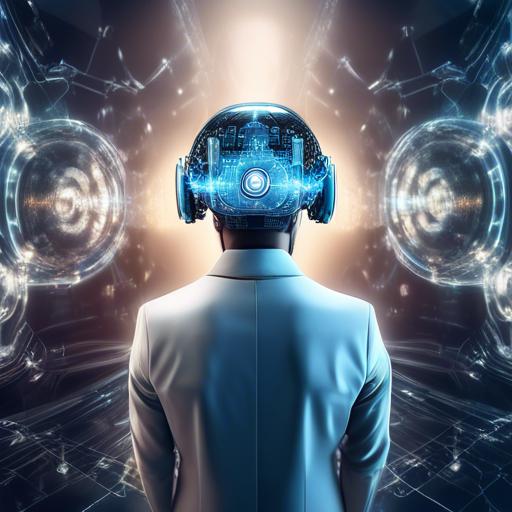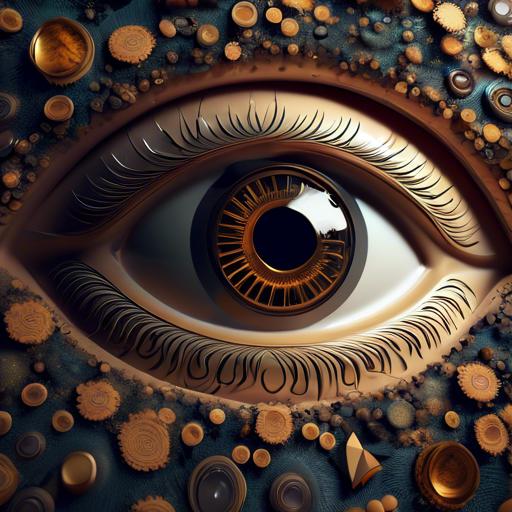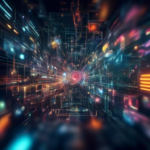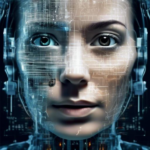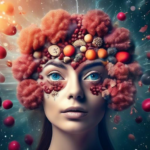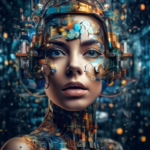In a world where pixels and palettes intersect with blockchain and bytes, a new horizon of creativity unfurls: AI-generated artwork for NFTs. Imagine the limitless possibilities where your artistic vision can meld with the cutting-edge capabilities of artificial intelligence, crafting masterpieces that exist both as unique digital assets and tokens of value. This isn’t just another click-bait rundown of tech jargon and quick fixes; it’s an invitation to explore a vibrant intersection of creativity and technology. Whether you’re an artist eager to breathe life into your digital gallery or a tech enthusiast curious about the fusion of art and AI, this guide will support you every step of the way. Join us as we navigate through the canvas of algorithms and brushstrokes of blockchain, empowering you to create, mint, and market your unique AI-generated art pieces as Non-Fungible Tokens. The future of digital art awaits—let’s embark on this journey together!
Table of Contents
- Unleashing the Creative Potential of AI in NFT Art
- Choosing the Right AI Tool for Your Artistic Vision
- Crafting Unique and Engaging NFT Concepts
- Mastering AI Techniques for Stunning Visuals
- Ethical Considerations in AI Art Creation
- Optimizing Resolution and Formats for NFT Marketplaces
- Protecting and Authenticating Your AI-Generated Masterpieces
- Wrapping Up
Unleashing the Creative Potential of AI in NFT Art
AI technology is revolutionizing the way digital art is created, opening up endless possibilities for artists eager to delve into the NFT realm. By leveraging sophisticated algorithms and neural networks, AI can assist in transforming abstract concepts into stunning pieces of digital art.
- Explore various AI tools like **DeepArt**, **RunwayML**, or **Artbreeder**.
- Experiment with different styles and mediums, allowing the AI to fuse them seamlessly.
- Combine traditional art techniques with AI-generated elements for a unique creation.
One innovative approach is **collaborative creation**, where human creativity meets AI interpretation. This synergy can lead to the development of artwork that is not only visually captivating but also deeply meaningful. By inputting broad design parameters or even simple sketches, you can guide the AI to produce art that aligns with your vision.
| Tool | Features | Usage |
|---|---|---|
| DeepArt | Style Transfer | Simple uploads and transformation |
| RunwayML | Machine Learning Models | Flexible and customizable |
| Artbreeder | Image Blending | User-friendly interface |
To maximize the impact of your AI-generated NFT artwork, consider blending **algorithmic precision** with **human touch**. Whether through enhancing fine details or making creative decisions during the process, your intervention can add invaluable depth to the final product.
Lastly, remember the importance of curating and refining your collections before minting them as NFTs. By ensuring each piece resonates both aesthetically and emotionally, you enhance the value and appeal of your NFT art. Dive into the digital canvas, and let AI amplify your creative voice like never before.
Choosing the Right AI Tool for Your Artistic Vision
First, you’ll need to identify what features are indispensable for your artistic creation. Are you looking for intricate detail or surreal designs? Decipher the type of art you want to create and check if the AI tools align with your creative needs. For instance, tools like **DeepArt** are excellent for transforming your photos into masterpieces, while **Artbreeder** allows for collaborative and evolving art. Your choice should resonate with your artistic vision.
Consider the **ease of use** and **learning curve** associated with various AI tools. Some platforms offer user-friendly interfaces and detailed tutorials, while others might need a steeper learning curve. Here are a few tools to consider:
- DeepArt: Known for its high-detail and precise transformation capabilities.
- Artbreeder: Supports collaborative artworks and gradual evolution of designs.
- RunwayML: Offers an array of AI models for artistic experimentation.
Evaluate the **output quality** and style options available. Each AI tool has a unique signature which might not align with all styles. Some tools might excel in impressionist styles, while others are better suited for abstract art. It’s paramount to experiment with different tools to find the one that complements your vision. Here’s a quick comparison:
| AI Tool | Best For | Difficulty Level |
|---|---|---|
| DeepArt | Detail-oriented art | Medium |
| Artbreeder | Collaborative creations | Easy |
| RunwayML | Experimental designs | Advanced |
Don’t forget to review the **costs and accessibility** of the tools. Some platforms offer free versions with limited capabilities, while others might require subscriptions for full access. Balancing the features you need with your budget is crucial for a sustainable artistic practice. Tools like **RunwayML** provide flexible pricing models based on the usage, which can be beneficial if you’re testing out different approaches.
Lastly, look into the **community and support** surrounding these tools. Engaging with a platform that has an active user community can provide invaluable insights, inspiration, and technical support. Communities like those around **Artbreeder** often share projects and ideas, potentially sparking your next big NFT masterpiece.
Crafting Unique and Engaging NFT Concepts
As the NFT landscape continues to evolve, creating artwork that stands out is crucial. **Merging AI with your artistic vision** can open up new realms of creativity. Start by exploring various AI tools that generate artwork, such as DeepArt, RunwayML, or Artbreeder. These platforms offer different algorithms and templates to help you get inspired and diversify your creations.
In the process of concept development, think beyond just the visual appeal. Consider the **emotional and narrative elements** of your NFT. Ask yourself questions like:
- What story does this piece tell?
- How does it connect to the audience emotionally?
- Does it represent a unique idea or perspective?
Engagement is another critical aspect. An engaged audience is more likely to invest in your NFTs. **Interactive elements** such as hidden messages, augmented reality features, or evolving art pieces that change over time can significantly enhance the user experience. Below is a table of ideas to inspire interactive features for your NFTs:
| Feature | Description | Tool |
|---|---|---|
| Hidden Messages | Reveal secret text or images through user interaction. | Photoshop, GIMP |
| Augmented Reality | Enhance your NFT with AR for an immersive experience. | Unity, ARKit |
| Evolving Art | Create art that changes based on certain triggers or time. | Generative Adversarial Networks (GANs) |
Lastly, **don’t shy away from experimentation**. Break the conventional boundaries by blending various art styles or exploring different cultural influences. Your journey in can lead to extraordinary creations when fueled by imagination and innovation.
Mastering AI Techniques for Stunning Visuals
Embracing AI techniques can drastically transform the way you create artwork, particularly for NFTs. *Generative Adversarial Networks (GANs)* are among the most notable tools in the AI art space. By pitting two neural networks against each other—the generator and the discriminator—GANs can create images that evolve into stunning pieces of digital art. The process involves training the network with a plethora of images until it can produce artwork that blends creativity with a touch of randomness.
**Why AI in NFT Art Creation?**
- **Consistency**: AI-driven techniques ensure a uniform style or theme across multiple pieces.
- **Scalability**: Create a large volume of artworks effortlessly.
- **Innovation**: Incorporate new, unique styles that might be challenging for human artists to replicate.
AI tools are plentiful, from OpenAI’s DALL-E to DeepArt and Artbreeder. These platforms offer various customization levels, enabling artists to tweak parameters to reflect their vision. Generating NFT artwork starts with selecting the right AI tool to fit your artistic style. **Experimentation** is key here, as each tool comes with its strengths and unique algorithms.
Here’s a simplified comparison of popular AI art tools for NFTs:
| **Tool** | **Main Feature** | **User Experience** |
|---|---|---|
| DALL-E | Natural language prompts | Intuitive and flexible |
| DeepArt | Style transfer | User-friendly |
| Artbreeder | Image customization | Highly customizable |
When using AI to craft NFTs, remember that post-processing is equally crucial. Use photo editing software to refine edges, enhance colors, and ensure the final piece resonates with a human touch. AI art can sometimes lack the intentional imperfections that make human art feel alive, so tweaking your creations can add that needed flair.
Taking advantage of AI to generate NFT artwork isn’t just a technical feat; it’s a new frontier in digital creativity. By mastering these techniques, you allow your artistic expression to traverse uncharted territories, resulting in visuals that captivate and engage in an increasingly digital world.
Ethical Considerations in AI Art Creation
When delving into the realm of AI-generated artwork for NFTs, it is crucial to navigate the landscape with a keen awareness of ethical implications. Ensuring ethical practices can set a positive precedent, while negligence can lead to contentious outcomes. Below are several key considerations to bear in mind:
1. Data Transparency and Consent:
- Ensure that the data used to train AI models is obtained ethically.
- Secure explicit consent from creators of original works that inspire the AI-generated content.
- Be transparent about the sources and methods used to generate your AI artwork.
2. Ownership and Copyright:
| Aspect | Consideration |
|---|---|
| Attribution | Always provide proper attribution to original artists. |
| License Agreements | Review and adhere to license agreements for datasets. |
| Creative Commons | Consider using public domain or Creative Commons-licensed works. |
3. Fairness and Bias:
- Assess and mitigate any biases in the AI models to avoid perpetuating stereotypes.
- Strive for inclusivity by incorporating diverse datasets.
- Develop and deploy fairness auditing tools to periodically review the outputs of your AI artwork.
4. Environmental Impact:
- Consider the carbon footprint of training large AI models and generating NFTs.
- Adopt more sustainable practices, such as using energy-efficient hardware and cleaner energy sources.
- Explore and support blockchain technologies that prioritize environmental sustainability.
Maintaining ethical standards in AI art creation is not just a responsibility but an opportunity to foster trust and innovation in the rapidly evolving digital art space. By prioritizing ethical considerations, creators and collectors alike can contribute to a more inclusive, respectful, and sustainable future for digital art and NFTs.
Optimizing Resolution and Formats for NFT Marketplaces
When aiming to sell AI-generated artwork as NFTs on various marketplaces, choosing the right resolution and format is essential to make your artworks stand out. High-quality images not only look more professional but also appeal to potential buyers who are considering investing in digital art.
Optimal Resolution and File Size
- The typical resolution for NFT artworks is 300 DPI (Dots Per Inch). This ensures crisply detailed images.
- As for dimensions, many artists recommend a minimum of 1024 x 1024 pixels to preserve detail, but going as high as 2048 x 2048 pixels can make a significant difference, especially when viewed on large screens.
- Be mindful of file size. Larger files (over 10MB) can be harder to upload and may deter potential buyers due to loading times.
Best File Formats for NFTs
- PNG: Great for images with transparent backgrounds. Ideal for artworks with sharp edges and bright colors.
- JPEG: Versatile and widely accepted. Excellent for artworks with gradients or subtle color transitions.
- GIF: Perfect for short, looping animations. Limited to 256 colors, making it suitable for simpler graphical styles.
- MP4/WebM: Preferred for high-quality, longer animations or video clips.
When preparing artwork for multiple NFT marketplaces, it’s advisable to create several versions of your assets. This ensures compatibility across platforms and can also cater to buyers with different preferences.
| Platform | Preferred Formats | Max File Size |
|---|---|---|
| OpenSea | JPEG, PNG, GIF, MP4 | 100 MB |
| Rarible | JPEG, PNG, GIF | 30 MB |
| SuperRare | JPEG, PNG, GIF | 50 MB |
Keep experimenting with different resolutions and formats to discover what best showcases your unique AI-generated works. Remember, the easier you make it for collectors to enjoy and purchase your artwork, the more successful you’ll be on NFT marketplaces.
Protecting and Authenticating Your AI-Generated Masterpieces
Creating AI-generated artwork is an exciting frontier for NFTs, but ensuring your digital masterpieces are both protected and authenticated is crucial for maintaining their value and integrity. Here, we explore effective methods to safeguard your AI creations and confirm their authenticity.
Use Watermarking and Signature Techniques
- Watermarking: Embed a watermark directly into your artwork. This can be a subtle digital signature or a more visible mark depending on your preference. Watermarks can deter unauthorized use and help in tracing the original creator.
- Digital Signatures: Utilize cryptographic signatures that are embedded within the file itself. These signatures are much harder to tamper with and can serve as a strong proof of ownership.
Issue Certificates of Authenticity
Adding a unique certificate of authenticity for each piece of art strengthens its credibility and uniqueness. These certificates can be generated using blockchain technology to assure buyers of the piece’s legitimacy.
| Protection Method | Description |
|---|---|
| Watermarking | Adds a visible or hidden mark to identify the creator |
| Digital Signatures | Uses cryptographic methods to verify authenticity |
| Certificates of Authenticity | Blockchain-based certificates providing proof of originality |
Leverage Secure NFT Marketplaces
Choose NFT marketplaces that prioritize security and transparency. Platforms like OpenSea, Rarible, and Foundation offer robust security features and verification processes that can add an extra layer of protection to your artwork.
Engage with the Community
building a solid reputation within the NFT and AI art communities is key to establishing trust. Share your creation process, engage with your audience, and respond to feedback. This transparency fosters trust and helps protect your authenticity.
Wrapping Up
As you venture into the exciting world of creating AI-generated artwork for NFTs, remember that the only limit is your imagination. Embrace the endless possibilities that artificial intelligence brings to the realm of art. Trust in your creativity and let the algorithms guide you to new and innovative forms of expression. Keep pushing boundaries, experimenting, and refining your craft. The future of art is in your hands, so go forth and create masterpieces that will captivate the digital art world. Good luck on your artistic journey, and may your NFTs shine bright in the ever-evolving landscape of AI-generated artwork.

